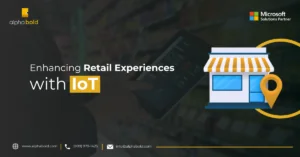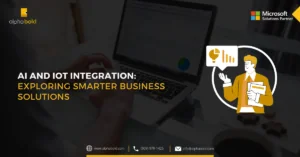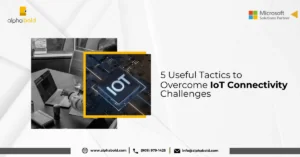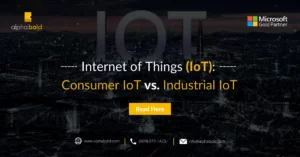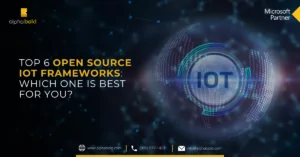Table of Contents
Introduction
When Kevin Ashton first coined the term “IoT,” he envisioned a system that seamlessly connected the physical world to the internet through universal sensors. Could he have foreseen that connected devices would one day outnumber humans on Earth? Likely not. Yet, this is the reality of IoT today. According to Frost & Sullivan, there were 41.76 billion active IoT-connected devices in 2023. IoT Analytics estimates 16.7 billion active endpoints, while Statista places the number at 15.14 billion. These figures highlight just the beginning of benefits of IoT development and its expansive reach.
Every industry worldwide is reaping the benefits of IoT development, making it a cornerstone of modern business strategy. The scope of IoT by 2025 is ever-expanding, boosted by initiatives like digitization and the development of smart cities. This increase in demand is driven by rising adoption across sectors such as healthcare, agriculture, and manufacturing. The increasing need for smart solutions and operational efficiency propels IoT forward, solidifying its role as a key technology for the future. For those vested in IoT, the opportunities by 2025 will be monumental. This blog will explore this phenomenon and discuss the four sectors poised to benefit most from IoT development in the business world by 2025.
The Growing Importance of IoT in Corporate Strategy
While AI has dominated recent headlines, IoT remains a critical priority for businesses aiming to stay competitive. According to the “State of IoT – Spring 2024” report, surveys from PWC, KPMG, and BCG consistently place IoT among the top three investment priorities, just behind AI. This reflects the benefits of IoT development in shaping modern corporate strategies.
For decision-makers, the synergy between AI and IoT offers a powerful avenue for innovation and efficiency. Since Q3 2022, mentions of these technologies in company earnings calls have surged by 61%, signaling their growing integration. This convergence isn’t just a fleeting trend but a strategic imperative that enhances operational efficiencies and drives business growth. The benefits of IoT development are becoming increasingly clear as companies realize the long-term value of integrating these technologies.
IoT Analytics’ latest report highlights nearly 40 emerging trends that will shape the future of IoT. Despite a revised market growth forecast to a 17% CAGR until 2030, the IoT sector remains robust, demonstrating resilience and adaptability in a changing economic landscape. Favorable economic indicators further bolster the case for IoT investments. With inflation rates easing and supply chains stabilizing, the environment for IoT implementation has never been better. Companies across various industries are already reporting significant year-on-year growth in revenue and gross margins within the IoT sector, showcasing the substantial benefits of IoT development.
For C-level executives, the message is clear: integrating IoT into your corporate strategy is no longer optional—it’s essential. The strategic advantages and operational efficiencies gained through IoT, particularly when paired with AI, can position your organization at the forefront of industry innovation. As we discuss the four sectors poised to benefit most from IoT development by 2025, the urgency to invest and innovate becomes increasingly apparent.
Further Read: 10 Operational Inefficiencies That Can Be Solved by AI
Manufacturing Industry and IoT Development
Manufacturers have grappled with high maintenance costs, unexpected equipment failures, production bottlenecks, and maintaining consistent product quality for years. These issues don’t just chip away at the bottom line; they threaten the very competitiveness critical for survival in 2025 and beyond. As the stakes rise, so too does the pressure on decision-makers to optimize processes and embrace the technology that will future-proof their operations. The benefits of IoT development in manufacturing are becoming undeniable.
IoT Solutions: Predictive Maintenance
IoT development is revolutionizing manufacturing by transforming how data is collected and utilized on the factory floor. Imagine a factory where every machine communicates, predicting its own failures before they occur. This is what IoT brings to manufacturing. By integrating sensors and advanced analytics, IoT enables manufacturers to gather real-time data, identify trends, and make informed decisions that optimize production processes.
Among the most impactful applications of IoT is predictive maintenance. Manufacturers no longer need to wait for equipment to break down; with IoT, they can predict and prevent failures, minimize unplanned downtime, reduce maintenance costs, and ensure a smooth production flow that keeps the factory running at peak efficiency.
Benefits of IoT Development for Manufacturing:
- Enhanced Productivity: Real-time monitoring and data analysis enable manufacturers to identify and address inefficiencies promptly, leading to increased productivity.
- Cost Reduction: Predictive maintenance helps organizations avoid costly breakdowns and enables them to optimize maintenance schedules, resulting in significant cost savings.
- Improved Product Quality: Early detection of equipment issues helps maintain consistent product quality, reducing defects and waste.
- Streamlined Operations: IoT-enabled machines can communicate with each other, fostering a more coordinated and efficient production process.
- Data-Driven Insights: IoT provides manufacturers with valuable data that can be leveraged to make informed decisions, improve processes, and drive innovation.
Real-World Impact:
A 2022 Deloitte survey revealed that over 86% of respondents believe smart factory initiatives driven by IoT will be the main driver of manufacturing competitiveness in the next five years. This overwhelming consensus underscores the urgency for manufacturers to embrace IoT development. By doing so, they can unlock new efficiency, productivity, and competitiveness levels, positioning themselves as leaders in an increasingly digital and interconnected world.
AlphaBOLD Drives TaylorMade Golf's Smart Factory Success:
AlphaBOLD’s IoT solutions transformed TaylorMade Golf’s manufacturing by integrating systems, automating processes, and improving data accuracy. This led to reduced costs, minimized waste, and increased customer satisfaction, establishing TaylorMade Golf as an industry leader. In this case, the benefits of IoT development are clear—greater efficiency and higher customer satisfaction. Read More.
Are you a Manufacturer Interested In IoT? Get Started with AlphaBOLD
AlphaBOLD has years of experience implementing, customizing, and sustaining IoT solutions for clients across the globe. We can help you achieve your Industry 4.0 ambitions while cutting costs and increasing efficiency.
Request a ConsultationHealthcare Industry and IoT Development
IoT Solutions: Remote Patient Monitoring
Benefits of IoT Development for Healthcare:
- Early Disease Detection and Prevention: IoT devices will become more sophisticated, enabling earlier and more accurate detection of potential health issues allowing for timely interventions and preventive measures.
- Personalized Treatment Plans: The vast amounts of patient data collected by IoT devices will be leveraged by artificial intelligence (AI) and machine learning algorithms to create highly personalized treatment plans that optimize outcomes for individual patients.
- Reduced Hospital Readmissions: Remote patient monitoring systems will be widely adopted, enabling continuous monitoring of patients with chronic conditions, significantly reducing hospital readmissions and improving patient recovery.
- Enhanced Patient Engagement: IoT-powered mobile apps and platforms will give patients real-time access to their health data, educational resources, and virtual consultations with healthcare providers, fostering greater engagement and empowerment in managing their health.
- Streamlined Operations and Cost Reduction: IoT-enabled solutions will continue to automate routine tasks, optimize workflows, and improve resource utilization, resulting in increased efficiency and significant cost savings for healthcare providers.
Real-World Impact:
The potential of IoT in healthcare is already making waves. A study published in the Journal of Medical Internet Research found that remote patient monitoring reduced hospital readmissions by 50% and emergency department visits by 20% among heart failure patients. This isn’t just a glimpse into the future—it’s happening now. Companies like Edwards Lifesciences are exploring IoT-embedded solutions to capitalize on this potential, recognizing that the healthcare landscape is rapidly shifting.
Looking ahead to 2025, innovative solutions like SobrSafe’s alcohol detection wearable, made possible by AlphaBOLD’s expertise, showcase the potential for IoT to revolutionize industries. This groundbreaking smartwatch detects alcohol through the skin in real-time, eliminating the need for breath, blood, or urine samples, and stands as a testament to the power of IoT.As more companies realize the transformative potential of IoT in healthcare, the time to act is now. If you’re looking to harness this technology and take charge of the future, AlphaBOLD is here to help. Discover how we can revolutionize your industry—Request a consultation today.
Agriculture Industry and IoT Development
IoT Solutions: Precision Farming Platforms
Benefits of IoT Development for Agriculture:
- Resource Optimization: Monitor and control water and fertilizer usage, minimizing waste and reducing environmental impact.
- Increased Yields: Optimize planting, irrigation, and harvesting schedules based on real-time data, leading to higher crop yields and improved profitability.
- Pest and Disease Management: Early detection of pests and diseases through IoT sensors enables targeted interventions, reducing crop losses and minimizing pesticide use.
- Supply Chain Efficiency: Track and monitor the movement of produce from farm to table, ensuring freshness, quality, and timely delivery.
- Data-driven Decision-making: Leverage data analytics and predictive modeling to make informed decisions about crop selection, planting, and resource allocation.
Real-World Impact:
Take your Agriculture Operations to the Next Level
Don’t get left behind—let AlphaBOLD help you navigate this transformation with tailored IoT solutions that meet your unique needs.
Request a ConsultationEnergy Industry and IoT Development
The energy sector is at a crossroads. Aging infrastructure, fluctuating demand, the urgent need for renewable energy sources, and rising consumer expectations for efficiency are pushing the industry to its limits. These challenges don’t just threaten the stability of our energy systems—they jeopardize their sustainability and affordability as well. Yet, in the face of these complex issues, IoT emerges as a beacon of innovation, offering sustainable and cost-effective solutions.
IoT Solutions: Smart Grids for Intelligent Energy Management
IoT-powered smart grids are not just changing the game—they’re revolutionizing the entire energy sector. With connected sensors and intelligent meters, these smart grids enable real-time monitoring and control of energy consumption, distribution, and generation. This isn’t just about optimizing energy usage; it’s about driving a fundamental shift towards renewable energy sources. In a world where 67% of US citizens prioritize green energy, IoT solutions are crucial in aligning with the public’s growing desire for sustainability.
Moreover, consumers benefit from data-driven insights into their energy usage patterns, empowering them to make cost-saving decisions and contribute to their community’s environmental goals. IoT devices also enhance grid resilience through predictive maintenance and enable faster emergency responses for energy companies. As the demand for sustainable energy solutions intensifies in 2025 and beyond, IoT will be an essential tool for driving digital transformation and fostering innovation in the energy sector.
Benefits of IoT Development for Energy:
- Optimized Energy Distribution: Real-time data allows for efficient energy distribution, reducing waste and minimizing the risk of outages.
- Enhanced Energy Efficiency: Identify and address inefficiencies in energy consumption, leading to cost savings and reduced environmental impact.
- Demand Response: Dynamic pricing models incentivize consumers to shift their energy usage during peak hours, balancing demand and improving grid stability.
- Integration of Renewable Energy: Smart grids facilitate the seamless integration of renewable energy sources like solar and wind, contributing to a cleaner energy future.
- Improved Asset Management: Remote monitoring and predictive maintenance of energy infrastructure enhance reliability and reduce downtime.
Real-World Impact:
Retail Industry and IoT Development
IoT Solutions: Inventory Tracking Systems Smart Shelfs
IoT solutions are being used in the retail industry to extract real-time insights that enhance customer experiences, optimize overall inventory management, and streamline retail operations. Smart shelves with RFID tags and sensors track inventory levels in real-time, alerting staff to low stock levels and preventing out-of-stock situations. This technology also optimizes product placement based on customer data, ensuring that stores are always ready to meet consumer demand.
Benefits of IoT Development for Retail:
- Enhanced Customer Experiences: Personalized recommendations and targeted promotions based on customer data create a more engaging and satisfying shopping experience.
- Efficient Inventory Management: Real-time inventory tracking prevents stockouts and overstocks, reducing costs and improving customer satisfaction.
- Optimized Supply Chain: Track goods from production to delivery, ensuring timely delivery and product quality.
- Data-Driven Insights: Analyze customer behavior and preferences to make informed decisions about marketing, product placement, and store layouts.
- Cost Savings: Automate tasks like lighting and temperature control to reduce energy costs and improve operational efficiency.
Real-World Impact:
The transformative potential of IoT in retail is already evident, with industry giants like Walmart and Macy’s leading the charge in leveraging this technology. IoT is creating a more connected, data-driven, personalized shopping experience that reshapes the retail landscape.
For instance, Walmart has integrated IoT technology within its stores to enhance equipment management. By using sensors and IoT applications, Walmart monitors individual refrigerators’ temperatures and tracks critical equipment’s condition. This proactive approach allows them to address potential issues before they become problems, reducing the risk of breakdowns. Additionally, Walmart employs IoT sensors to remotely manage HVAC systems across different regions or even specific stores, optimizing energy consumption and lowering utility costs—all without compromising the customer experience.
Similarly, Macy’s has harnessed the power of IoT to revolutionize its inventory management and asset protection. By implementing RFID tags throughout its stores, Macy’s has significantly improved inventory visibility, ensuring that the right products are available when customers need them. These tags also play a crucial role in theft prevention, providing real-time data on the location and status of items, which helps Macy’s quickly respond to security concerns and protect their assets.
Struggling with Inventory Management and Retail Operations?
IoT could be your solution if managing inventory and meeting customer demands are constant challenges. By integrating smart technology, you can streamline operations, enhance customer experiences, and improve your bottom line.
Request a ConsultationBenefits of IoT Development with AI Advancements
In this blog, we have continued to explore IoT transforms multiple industries—from manufacturing and healthcare to agriculture and retail. But what truly unlocks the potential of IoT is its powerful synergy with AI. Together, these technologies can potentially change every process in every business industry.
AI’s ability to analyze vast amounts of data and make intelligent decisions elevates IoT devices, making them smarter, more responsive, and more adaptive to the unique needs of each industry. For example:
AI-driven IoT solutions enable predictive maintenance and real-time monitoring in manufacturing, ensuring that production lines run smoothly and efficiently.
AI and IoT work together in healthcare to provide continuous patient monitoring and personalized treatment plans, enhancing patient outcomes and reducing costs.
In agriculture, precision farming powered by AI and IoT maximizes crop yields while minimizing environmental impact, making farming more sustainable and profitable.
In retail, the combination of AI and IoT creates personalized shopping experiences and optimizes inventory management, ensuring that customers find exactly what they need when they need it.
These examples highlight just a few ways AI and IoT are reshaping industries. The benefits are clear: increased efficiency, improved quality, and a more personalized customer experience. But the true potential of these technologies is realized when they’re seamlessly integrated into your business—a task that requires expert guidance.
That’s where AlphaBOLD comes in. We understand that each industry and business within those industries has its own challenges and opportunities. With our deep expertise in AI and IoT, we tailor solutions to fit your needs, ensuring you can harness these technologies to gain a competitive edge and optimize your operations.
Whether you’re in manufacturing, healthcare, agriculture, or retail, AlphaBOLD is here to help you navigate the complexities of AI and IoT integration. Our experience in implementing AI, IoT, mobile, and web apps means we know what works and what doesn’t, allowing us to craft the perfect strategy for your business. Request a Consultation with us today.
Conclusion
As we’ve explored throughout this blog, the benefits of IoT development across manufacturing, healthcare, agriculture, and retail are nothing short of revolutionary. By 2025, these industries will have undergone significant transformations driven by IoT, unlocking new efficiency, productivity, and innovation levels. But the journey doesn’t end here—it’s just the beginning. Whether you’re aiming to streamline operations, enhance customer experiences, or drive growth, IoT offers the solutions you need to succeed in a rapidly evolving digital landscape. At AlphaBOLD, we specialize in helping businesses like yours navigate the complexities of IoT and AI integration. With our expertise, you can harness the full potential of these technologies to transform your operations and achieve your strategic goals.
Ready to revolutionize your business with IoT? Request a consultation today and let AlphaBOLD guide you toward success in 2025 and beyond.


